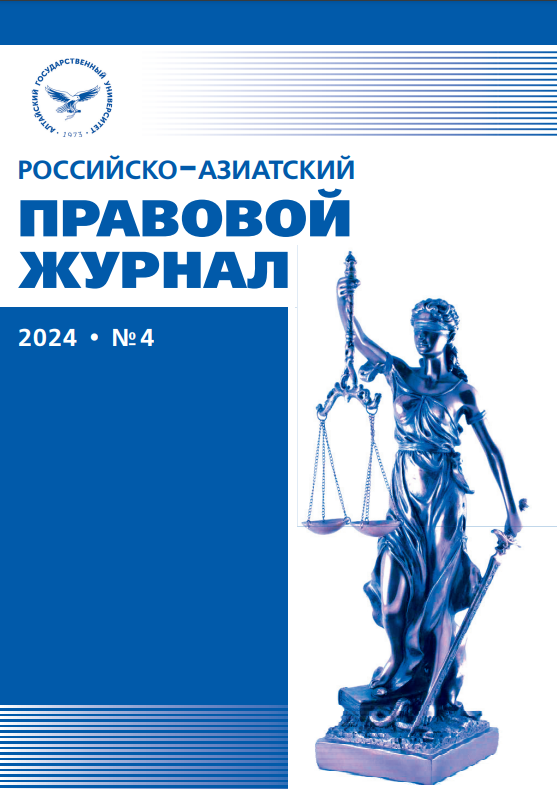EXECUTION OF A FOREIGN ECONOMIC TRANSACTION UNDER CONDITIONS OF RESTRICTIONS
УДК 347.1 ББК 67.930.0
Abstract
This article examines the problems arising in connection with the execution of a foreign trade transaction,in addition, the focus is on the issues of interaction between foreign and Russian legal entities in the contextof unilateral restrictive measures and sanctions. Proper fulfillment of obligations under a contract, bothdomestic and international, is called into question — in this regard, it is necessary to analyze the methods forproper execution of the contract in conditions of restrictions and analyze a number of problems associatedwith minimizing risks and maintaining a balance of interests of the parties to the contract. In the course ofthe study, the authors come to the conclusion that certain practical mechanisms are losing their relevanceand an in-depth study of understanding sanctions through the prism of civil law in Russia is required, as well as an arsenal of tools to overcome the failures of foreign trade contracts. Considering sanctions as forcemajeure or emphasizing their emergency loses practical and legal meaning. It is necessary to look for moreeffective ways to minimize risks and liability in the execution of a foreign trade contract. The results of thestudy may be useful for scientists studying the nature and impact of sanctions on contractual legal relations,and can also be used in the practical activities of Russian and international companies when entering intocontractual legal relations. As a tool for achieving the set result, the author uses the comparative legalmethod, as well as methods of analysis and synthesis.
Downloads
References
Елисеев И.В. Гражданско-правовое регулирование международной купли-продажи товаров. СПб., 2002. 234 с.
Бублик В.А. Гражданско-правовое регулирование внешнеэкономической деятельности в Российской Федерации: проблемы теории, законотворчества и правоприменения : монография. Екатеринбург, 1999. 228 с.
Принципы международных коммерческих договоров УНИДРУА 2010 / пер. с англ. А.С. Комарова. М. : Статут, 2013. LXXIV, 758 с.
ГК РСФСР 1964 г. Утв. ВС РСФСР 11 июня 1964 г. // Ведомости ВС РСФСР. 1964. №24. Ст. 407.
Основы гражданского законодательства Союза ССР и республик 1991 г. Утв. ВС СССР 31 мая 1991 г. №2211–1 // Ведомости СНД и ВС СССР. 1991. №26. Ст. 733.
Международное частное право: учебник / отв. ред. Г.К. Дмитриева. 2-е изд., перераб. и доп. М. : ТК Велби: Проспект, 2004. 364 с. URL: https://conflictlaws.narod.ru/olderfiles/1/Dmitrieva_G. K_Mezhdunarodnoe_chast-88715.pdf.
Шестакова Е.В. Договорные обязательства и их исполнение в условиях форс-мажора // Право Доступа. 2020. URL: https://base.garant.ru/77336709.
Постановление Девятого арбитражного апелляционного суда от 02.03.2021 N 09АП-2038/2021 по делу N А40–14071/2020. URL: https://www.consultant.ru/cons/cgi/online. cgi?req=doc&base=MARB&n=2002311#RVrwMUU2Zx2y4iDt3.
Постановление Правления ТПП РФ от 23.12.2015 №173–14. URL: https://www.consultant.ru/document/cons_doc_LAW_192640.
Письмо ТПП РФ от 22.03.2022 N ПР/0181 «О приостановлении рассмотрения заявлений о выдаче заключений об обстоятельствах непреодолимой силы по договорам, заключенным в рамках внутрироссийской экономической деятельности, в связи с санкционными ограничениями в отношении иностранных комплектующих и оборудования». URL: https://www.consultant.ru/document/cons_doc_LAW_412982
Определение Верховного Суда РФ от 30.07.2013 по делу N 18-КГ13–70. URL: https://www.consultant.ru/cons/cgi/online.cgireq=doc&base=ARB&n=351522#m1GvMUU2nyZKljVD1.
Определение Верховного Суда РФ от 23.05.2017 по делу N А39–5782/2015. URL: https://www.consultant.ru/cons/cgi/online.cgireq=doc&base=ARB&n=501085#SztuMUUknZaW0WbU.
Постановление Арбитражного суда Центрального округа от 04.09.2017 по делу N А83-7219/2016). URL: https://sudact.ru/arbitral/doc/ATRgykXf22dA.
Постановление Девятого арбитражного апелляционного суда от 5 февраля 2018 г. N 09АП-67215/17. URL: https://base.garant.ru/62362737.
Вилкова Н.Г. Новое лицо форс-мажора XXI века: новые обстоятельства, новые последствия, новые рекомендации // Третейский суд. 2022. №1. С. 83–90
Шапсугова М. Д. Свобода договора, правило автономии воли сторон и суверенитет государства: формирование приоритетов правового регулирования предпринимательских отношений в условиях санкций / под общ. ред. С.Д. Могилевского, М.А. Егоровой; Российская академия народного хозяйства и государственной службы при Президенте РФ. Юридический факультет им. М.М. Сперанского. М. : Юстицинформ, 2016.
Зотова А., Жук В. Способы исполнения международных договоров в условиях санкций // Столыпинский вестник: Научный сетевой журнал. №3/2022. URL: https://cyberleninka.ru/article/n/sposoby-ispolneniya-mezhdunarodnyh-dogovorov-v-usloviyah-sanktsiy
Copyright (c) 2024 Е.Ю. Коваленко, Т.Л. Платунова

This work is licensed under a Creative Commons Attribution 4.0 International License.
Russian-Asian Law Journal is a golden publisher, as we allow self-archiving, but most importantly we are fully transparent about your rights.
Authors may present and discuss their findings ahead of publication: at scientific conferences, on preprint servers, in public databases, and in blogs, wikis, tweets, and other informal communication channels.
Russian-Asian Law Journal allows authors to deposit manuscripts (currently under review or those for intended submission) in non-commercial, pre-print servers such as ArXiv.
Authors who publish with this journal agree to the following terms:
- Authors retain copyright and grant the journal right of first publication with the work simultaneously licensed under a Creative Commons Attribution License that allows others to share the work with an acknowledgement of the work's authorship and initial publication in this journal.
- Authors are able to enter into separate, additional contractual arrangements for the non-exclusive distribution of the journal's published version of the work (e.g., post it to an institutional repository or publish it in a book), with an acknowledgement of its initial publication in this journal.
- Authors are permitted and encouraged to post their work online (e.g., in institutional repositories or on their website) prior to and during the submission process, as it can lead to productive exchanges, as well as earlier and greater citation of published work (See The Effect of Open Access).








